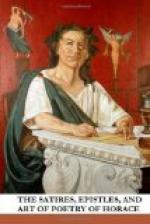Not like the coarse Calabrian boor, who pressed
His store of pears upon a sated guest,
Have you bestowed your favours. “Eat them,
pray.”
“I’ve done.” “Then carry
all you please away.”
“I thank you, no.” “Your boys
won’t like you less
For taking home a sack of them, I guess.”
“I could not thank you more if I took all.”
“Ah well, if you won’t eat them, the pigs
shall.”
’Tis silly prodigality, to throw
Those gifts broadcast whose value you don’t
know:
Such tillage yields ingratitude, and will,
While human nature is the soil you till.
A wise good man has ears for merit’s claim,
Yet does not reckon brass and gold the same.
I also will “assume desert,” and prove
I value him whose bounty speaks his love.
If you would keep me always, give me back
My sturdy sides, my clustering locks of black,
My pleasant voice and laugh, the tears I shed
That night when Cinara from the table fled.
A poor pinched field-mouse chanced to make its way
Through a small rent in a wheat-sack one day,
And, having gorged and stuffed, essayed in vain
To squeeze its body through the hole again:
“Ah!” cried a weasel, “wait till
you get thin;
Then, if you will, creep out as you crept in.”
Well, if to me the story folks apply,
I give up all I’ve got without a sigh:
Not mine to cram down guinea-fowls, and then
Heap praises on the sleep of labouring men;
Give me a country life and leave me free,
I would not choose the wealth of Araby.
I’ve called you Father, praised your royal grace
Behind your back as well as to your face;
You’ve owned I have a conscience: try me
now
If I can quit your gifts with cheerful brow.
That was a prudent answer which, we’re told,
The son of wise Ulysses made of old:
“Our Ithaca is scarce the place for steeds;
It has no level plains, no grassy meads:
Atrides, if you’ll let me, I’ll decline
A gift that better meets your wants than mine.”
Small things become small folks: imperial Rome
Is all too large, too bustling for a home;
The empty heights of Tibur, or the bay
Of soft Tarentum, more are in my way.
Philip, the famous counsel, years ago,
Was moving home at two, sedate and slow,
Old, and fatigued with pleading at the bar,
And grumbling that he lived away so far,
When suddenly he chanced his eye to drop
On a spruce personage in a barber’s shop,
Who in the shopman’s absence lounged at ease,
Paring his nails as calmly as you please.
“Demetrius”—so was called the
slave he kept
To do his errands, a well-trained adept—
“Find out about that man for me; enquire
His name and rank, his patron or his sire.”
He soon brings word that Mena is the name,
An auction-crier, poor, but without blame,
One who can work or idle, get or spend,
Who loves his home and likes to see a friend,
Enjoys the circus, and when work’s got through,




